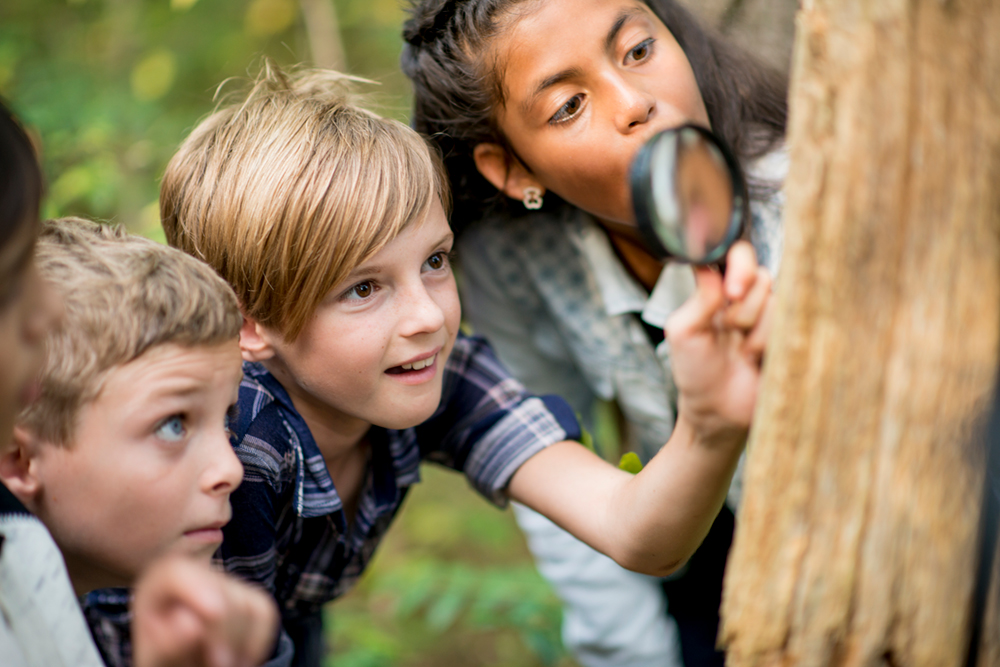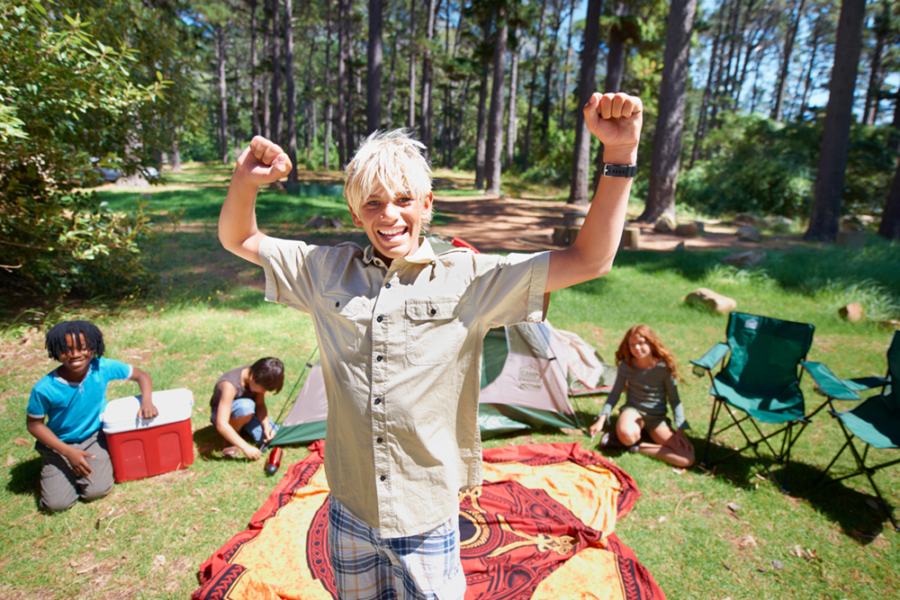The Importance of Nature Play in Child Development.
Growing up, I had a special spot in the corner of my backyard that felt like it was all mine. I would spend hours back there cooking stews made up of mud, leaves and sticks; making up stories about the lives of the bugs I saw; imagining I was an explorer in a new world; building forts with my sister, and observing the changes in the season. While I was having a ball outside, I of course didn’t realize all the positive affects nature was having on my development- it was just fun!
Being outdoors and in nature is associated with numerous benefits including better physical, mental, and emotional health. The natural environment is a complex and diverse one that contains opportunities for children to learn and develop in all areas. Although the many benefits of being in nature have been researched, children are spending less time outdoors than ever before. This disconnect to nature may be due to several factors including the prevalence of media and technology, less green space to play, safety concerns, and adult perceptions about the importance of time spent outdoors. Due to all of these factors, children spend much more time indoors involved in adult-planned activities than they do outside participating in free, spontaneous play. So why is nature play so important? We’ve outlined some key developmental areas, and how being outside positively affects children’s development in each domain.
Cognitive Benefits: While some schools have cut recess time in favor of more academic time, being outside in an unstructured environment has numerous cognitive benefits. It is common for children to have trouble focusing in the modern world with all the stimuli from media, and technology, as well as having to sit still for long periods of time. Luckily, nature has been found to have restorative effects on attention and thus it is cognitively beneficial for children to have outside breaks. Also, nature can be used as a subject of academic inquiry, not just as a break in between learning. The ever changing environment found outdoors provides ample opportunities for children to explore and learn through question-asking, observation, experimentation, and reflection. Richard Louv, author of The Last Child in the Woods, even states in his article, The More High-Tech Schools Become, the More They Need Nature, that schools which utilize the outdoors as a continuation of their indoor classrooms have reported higher student gains in academic subjects such as mathematics and language arts.
Physical Benefits: Nature play provides numerous opportunities for physical development through activities such as climbing, jumping, running, and balancing. The environment outside is ever changing which gives children new terrain to encounter daily and access risk. Outdoor spaces also tend to be larger than the indoor spaces children play in, allowing children opportunities to move in different ways and experiment with what their bodies are capable of. On any given day one of SEEC’s classes can be seen engaging in large and small muscle development when out on our playground or the National Mall. From climbing up on a tree stump, to carefully sorting through dirt and collecting small pebbles, nature play helps develop all muscles of the body. Research also shows that children who have positive experiences in nature will grow up to be adults who enjoy being outside, so nature play is not only significant to developing physical skills, but also in maintaining children’s current and future health.
Social Benefits: With a little planning ahead,Nature is all-inclusive, it does not matter what a person’s ability, race, gender or class; there are opportunities for everyone to play outside. Play outside is also usually unstructured, which allows children to share, cooperate, and navigate peer conflicts. Nature play commonly supports small group play, as this photo demonstrates, in order to move a heavy log, a child must enlist the help of their peers.
Empathy Benefits: Nature play can also play a role in young children’s development of theories of mind by supporting the type of perspective taking that is critical to moving beyond an egocentric view of the world. When children play in nature, they are engaging with living beings other than themselves, from trees and grass to birds and caterpillars. This direct exposure to other living organisms offers a host of access points for children to begin developing an understanding of plants and animals as individual living things, like themselves, and develop larger understandings of what living things need.
By establishing positive connections between young children to the plants and animals that share their world, time outdoors promotes empathy to all the plants and animals in nature. Reduction in children’s exposure to nature can result in their developing fearful responses to and misunderstandings about nature, specifically surrounding certain “less-desirable” parts of nature: bugs, dirt, germs. However, when young children are given the opportunity to explore the natural world on their own terms through play, particularly when in the company of a trusted adult, they create connections to and positive associations with natural spaces as their brains form critical neural pathways. By framing nature and wild spaces as places of wonder early in development, we are helping children build the ability to care for those places in the future. In fact, research has shown that people who spend more time outdoors are more concerned about the environment, and are more invested in protecting it.
Positive Sense of Self Benefits: Nature is, by definition, real and changeable. The natural play environment that a child encounters on Tuesday will be different on Thursday as leaves fall, winds blow, and animals move. When adults encourage children to self-direct their own play in nature, this environment of constant change offers rich opportunities for children to develop confidence and practice making choices. On the flip side, the unpredictability of the environment can be frustrating for a child who finds that she is unable to replicate yesterday’s play experience exactly. However, when a supportive adult can helps her reframe these changes into a positive opportunity to have new adventures, it can be a great opportunity for practicing self-regulation and control.
Additionally, participating in nature play offers even the youngest learners the opportunity to participate actively and authentically in environmental conservation. Too often, issues in environmental conservation are introduced with a pessimistic outlook that can feel overwhelming to children. By offering children the opportunity to practice caring behaviors in wildlife and wild spaces, nature play empowers children and gives them the opportunity to take positive action, even if only in play.
We know nature play is great and beneficial to children’s growth, but how can it be incorporated more into a child’s home and school life? Be sure to check back next week for a Top 5 Nature blog for ideas to include more nature into your young child’s life! In the meantime, check out SEEC’s Nature Pinterest board for resources and inspiration.
References:
Berto, R. (2014). The role of nature in coping with psycho-physiological stress: A literature review on restorativeness. Behavioral Sciences, 4, 394-409.
Burris, K., & Burris, L. (2011). Outdoor play and learning: Policy and practice. International Journal of Education Policy and Leadership, 6(8), 1-12.
Burris, K. & Burris, L. (2011) Fearful people: Parental perceptions and children’s outdoor activity. Delta Journal of Education, (1)1, 45-60.
Ernst, J. (2012). Early childhood nature play: A needs assessment of Minnesota licensed childcare providers. Journal of Interpretation Research, 17(1), 7-24).
Ferreria, M. M., Grueber, D., & Yarema, S. (2012). A community partnership to facilitate urban elementary students’ access to the outdoors. School Community Journal, 22(1), 49-64.
Fjørtoft, I. (2001). The natural environment as a playground for children: The impact of outdoor play activities in pre-primary school children. Early Childhood Education Journal, 29(2), 111-117.
Ingraham, C. (2015). There’s never been a safer time to be a kid in America. The Washington Post.
Louv, R. (2011). Reconnecting to nature in the age of technology. Futurist, 45(6), 41-45.
Louv, R. (2012). The more high-tech our schools become, the more they need nature. Science & Children, 49(7), 8-9.
Mainella, F. P., Agate, J. R., & Clark, B. S. (2011). Outdoor-based play and reconnection to nature: A neglected pathway to positive youth development. New Directions For Youth Development, 2011(130), 89-104.
Thompson, C. W., Aspinall, P., & Montarzino, A. (2007). Adult visits to green places and the significance of childhood experience. Environment and Behavior, 40(1), 111-143.
Zelenski, J. M., Nisbet, E. K. (2014). Happiness and feeling connected: The distinct role of nature relatedness. Environment and Behavior (46(1), 3-23.








Recent Comments